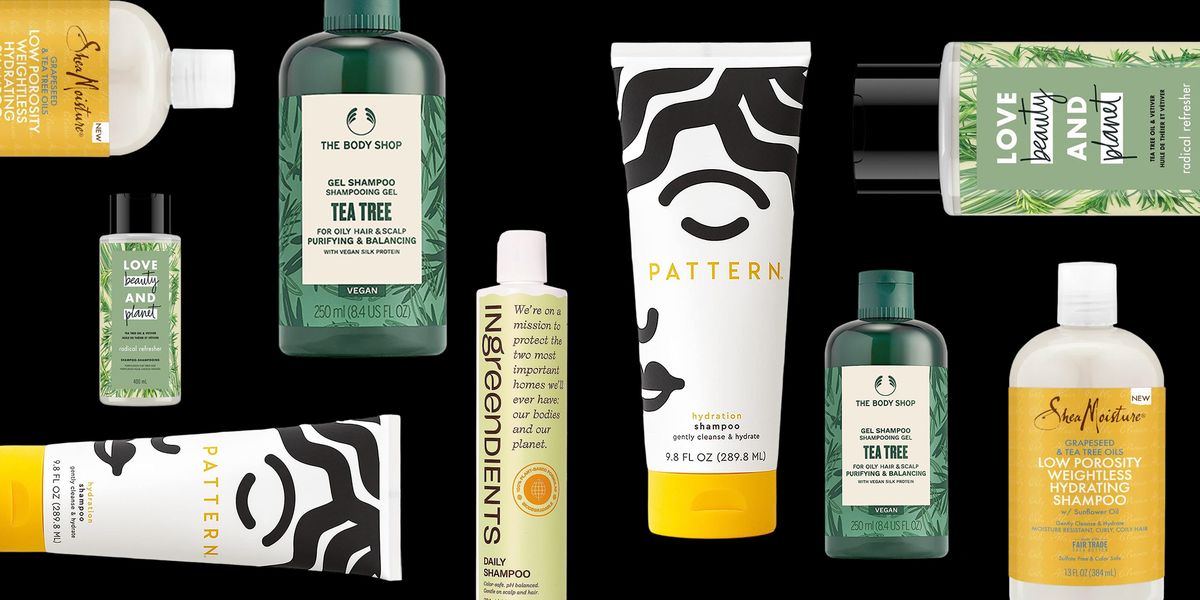Consider your hair concerns
Again, you don’t have to suffer from an itchy, irritated scalp in order to benefit from a tea tree shampoo. But if you do have dandruff, then you might want to consider getting a shampoo with medicated antifungals (like As I Am Dry & Itchy Scalp Care Dandruff Shampoo) or chemical exfoliants (like Briogeo Scalp Revival MegaStrength+ Dandruff Relief Shampoo), which will work alongside tea tree oil to help to control your scalp’s yeast production.
For the record, dandruff is actually triggered by excess oil on your scalp, not dry skin (which is why tea tree oil is clutch at helping to clear it up). So how can you tell the difference between dandruff and dry skin flakes? As trichologist Dr. Dominic Burg previously told Cosmo, “Dry-scalp flakes are usually quite small and noticeably dry,” while dandruff “sheds as larger flakes that are usually clumped together.” Oh, and keep in mind that you can have both dandruff and a dry scalp, just to make things more confusing!
Those with dry scalps can still benefit from tea tree shampoos—as tea tree oil helps wash away the flakes and debris—but if a dry scalp is your main concern, then you’ll want to make sure any tea tree oil shampoo you buy includes soothers, like aloe vera, to help with itch, as well as moisturizers, like shea butter, to hydrate your skin. A prime example: Alikay Naturals Moisturizing Black Soap Shampoo.
Examine the ingredients
Along with tea tree oil, ofc, the best tea tree shampoos tend to include moisturizers, exfoliants, and soothers that’ll help to calm inflammation and hydrate your skin, whether you’re dealing with a dry scalp or dandruff (or both!). And while hairstylist Meri-Kate O’Connor says anyone with dry scalp concerns—like dermatitis or eczema—should avoid harsh ingredients such as sulfates and artificial fragrance, some people can actually benefit from using sulfated detergents.
According to O’Connor, those who are oil-prone (as many dandruff sufferers are) could benefit from sulfates because of how deeply they can cleanse the hair. Sulfates tend to give the strongest cleanse, but there are plenty of sulfate-free surfactants that also do their job really, really well. You can always refer to a surfactants list to see which surfactants are harsh, mild, or gentle before buying a shampoo—and consider skipping the sulfate formulas if you have damaged, dry, or curly hair (think: types 3a to 4c).
Keep your hair type and texture in mind
Since tea tree oil has little to no effect on your hair itself, it’s widely considered safe for all hair types and textures. However! It’s always helpful to understand your hair porosity (aka your hair’s ability to absorb and retain hydration) when choosing a new shampoo. For instance, those with low-porosity hair will typically wanna stick with formulas that use lightweight serums to moisturize and soothe, while those with high-porosity hair can usually handle heavier oils and butters. (Not sure about your hair porosity? Take the Curls Bot porosity quiz.)
Likewise, it’s also good to know your hair type and determine what kind of formula will work best for your texture. (Did you know there are 12 distinct hair types??) Cosmo‘s got a helpful hair type guide to get ya started, ’cause knowledge is power, bb.

